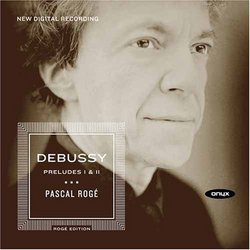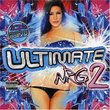| All Artists: Claude Debussy, Pascal Rogé Title: Debussy: Preludes I & II Members Wishing: 2 Total Copies: 0 Label: Onyx Classics UK Original Release Date: 1/1/2005 Re-Release Date: 9/13/2005 Album Type: Import Genre: Classical Styles: Chamber Music, Historical Periods, Classical (c.1770-1830) Number of Discs: 1 SwapaCD Credits: 1 UPC: 880040400424 |
Search - Claude Debussy, Pascal Rogé :: Debussy: Preludes I & II
 | Claude Debussy, Pascal Rogé Debussy: Preludes I & II Genre: Classical
|
Larger Image |
CD DetailsSimilar CDs
|
CD ReviewsIs there room for another "definitive version" of these? YE Rick Robertson | Roanoke, Alabama, USA | 12/25/2005 (5 out of 5 stars) "Many of my e-friends in the various piano-related Internet groups confess to a certain apathy toward the Debussy Preludes. Perhaps this disc could cause them to change their minds. This disc is Roge's first complete recording of the Preludes (I presume from the liner notes that he had recorded a selection in the analogue era) and that this marks the start of a complete Debussy cycle. To that I say "bring it on, Pascal". I have heard Gieseking (two versions), Jacobs, and Zimerman in both books, as well as Arrau, Dino Ciani, and countless other pianists in one book or in selections from both. The set by Paul Jacobs was the benchmark to which I compared all other performances (I found Zimerman wimpy, and some rhythms simply misread - more on that later.) And for me this Roge set outshines them all. If you wish to buy Zimerman, you must do so with TWO separate full-price DG discs, one for each book. Here Onyx squeezed both books on one full-price CD, a considerable saving. But price is the least reason why I prefer this set. Roge displays individual touches throughout the cycle. And he dares to play "La cathedrale engloutie" the way Debussy himself played it, NOT the way it was printed. He differentiates between 3/2 and 6/4 meters, with the half note or quarter note the beat unit where appropriate. He's not afraid of rubato, even if excessive (some places in "Minstrels" for example, for reasons of humor.) In the liner notes he talks of his study with Marguerite Long, and her corrections to the printed text. Perhaps this explains the "missed rhythm" that Zimerman plays at the very end of the second page of "La terrasse des audiences du clair de lune" - Roge does the same thing. The three quarter notes in 6/8 time are played as three eighth notes in 3/8 time. These two are the only pianists whom I have heard play this measure this way. It sounds reasonable, but it's not what's on the page, and both play it as quarters when the theme recurs later in the prelude. Did Debussy change this measure in printed copies? Both of these musicians are "too fine a musician" to make such a gross note-reading error in such a standard and familiar piece. "La terrasse" is an important piece in my repertoire, and I would like to solve this puzzle. Roge even seems to breathe life into the preludes I tend to dislike, such as "Danseuses de Delphes" and my absolute least favorite Debussy piece, "Des pas sur la neige". His subtle rubato helps make clear the despair Debussy wished to portray. I won't say that if you must own only one set, it should be this one, however. Mainly because there is much to enjoy in the sets by Zimerman and Jacobs, and of course Gieseking still commands respect. But this is an excellent set, "in modern sound", and may be preferable to Zimerman for the novice because of the difference in cost. This set makes me impatiently await the remainder of the cycle." A very personal account E. Weed | Houston, TX | 05/29/2006 (5 out of 5 stars) "Roge has recorded a number of the French "standards" over the years: Ravel, Debussy, Poulenc, Saint-Saens, Satie. It is his specialty, and reflects his heritage and training. His work is generally very well received, if occasionally criticized as being a bit reserved. Personally, I'm fond of his reserve, and think it has served the listeners well, particularly in the Poulenc and Ravel. He's recorded the first set of Debussy Preludes, but not the second, so this is his first go at both. By now, Roge's career in the recording studio is into its 4th decade. He is no longer a young man, and has had many years to consider these Preludes since he discovered them (at the age of 8). Further, as he states in the liner notes, he considers them "a canvas for my own imagination." This suggests that we could expect very personal (and even, perhaps, a bit eccentric) accounts of these works, and that is what we get. There are subtle variations in dynamics and phrasings, momentary hesitancies, a feeling of freedom (within the confines of superb technique and years of familiarity) that makes this recording, one one hand, very special, yet, on the other, probably not the first choice for the uninitiated. (It seems to be almost universally agreed that Paul Jacobs is the first choice, and, indeed, he is superb.) However, if you like the Preludes, and, frankly, if you think you've heard them a few too many times, Roge's set will be an excellent antidote. His approach offers the refreshingly intimate commentary of a master, after long years of study. How can we lose?" Another welcome version of Debussy's Preludes G. Stewart | Chesapeake, VA USA | 01/19/2009 (5 out of 5 stars) "I have too many versions of Debussy's Preludes to count. Some I find exceptional, others I find annoying. Roge's version is wonderful and will receive ample playing time for me.
Roge, from what I understand from others, has a style that is too reserved for some. If this is the case, I can't see any indication of reserve herein. Roge plays with a passion that oozes from the speakers, a liveliness that is infectious. I believe that these performances belong beside those of Michelangeli (Book 1 & Book 2) and, though I realize some don't particularly care for him, Jean-Yves Thibaudet, whose Debussy I find to be inviting and warm (Complete Piano, Vol. 1). Roge approaches these pieces with flourish and somberness as required amounting in a performance that I rarely hear in other attempts. I also recommended 2 of Roge's other Debussy discs, Debussy II & Debussy III to complete this collection." |

 Track Listings (24) - Disc #1
Track Listings (24) - Disc #1

